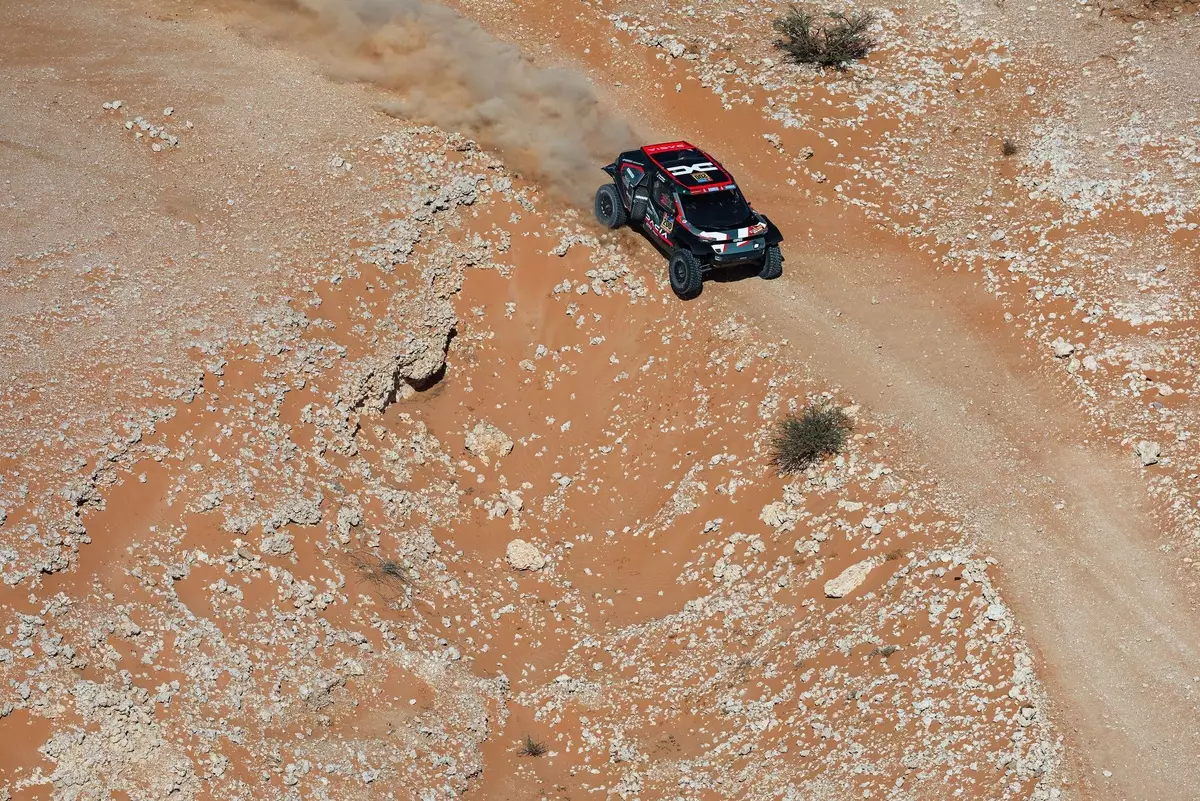The Dakar Rally, hailed as one of motorsport’s most formidable challenges, often serves as a stage where triumph and tribulation coalesce into a gripping narrative. Nasser Al-Attiyah, a seasoned competitor with an illustrious history, recently faced a harrowing episode in this year’s edition of the event. Here, we analyze the implications of his navigation error during Stage 10 and reflect on how such setbacks shape both the competitive landscape and Al-Attiyah’s psychological fortitude.
As the Dakar Rally ventured into the desolate yet breathtaking Empty Quarters of Saudi Arabia, the stark beauty of the dunes contrasted sharply with the intense pressure faced by the drivers. Al-Attiyah, known for his skillfulness in tackling such treacherous terrains, was not spared from the perils of the course. His co-driver, Edouard Boulanger, encountered a critical error early on—just nine kilometers into the stage. A simple mistake, involving confusion over navigational instructions, proved calamitous. The duo lost over 13 minutes in a stage that barely covered 120 kilometers, culminating in their most disappointing finish of the event, landing them in 30th place.
This incident highlights the intricate dance of reliance and responsibility among co-drivers and drivers in rally racing. The team must function coherently, each member trusting the other not to falter amidst the chaos of competition. Al-Attiyah’s admission of disappointment, stating he had never before been lost in the dunes of Dakar, sheds light on the unexpected psychological burdens placed upon even the most experienced competitors when facing unanticipated setbacks.
The fallout from this navigation error transcends mere timing; it penetrates the emotional and mental aspects of competition. A stressed athlete may not easily regain focus, and Al-Attiyah’s candid reflections reveal a man grappling with disappointment. He articulated a need for introspection and discussion regarding the “lot of stress” he had accumulated, indicating that the mental load of the race can be as burdensome as the physical demands.
This emotional state can alter a competitor’s approach to subsequent stages. Al-Attiyah’s initial confidence was noticeably clouded by uncertainty. As he noted, the hope of redeeming himself and his team is now overshadowed by a hefty 30-minute gap to the leader, Henk Lategan, and a challenging fourth place in the standings. This raises questions about how mental strain can influence a competitor’s strategy going forward. How does one push through the psychological barriers built from past mistakes? Al-Attiyah’s journey over the remaining stages will serve as a testament to resilience in the face of adversity.
Boulanger’s public acknowledgment of his blunder provides a glimpse into the importance of accountability in team sports, particularly within the high-stakes environment of rally racing. Rather than shying away from the repercussions of his mistake, he placed the blame squarely on himself, emphasizing the necessity of fortitude and partnership. His explanation—misinterpreting the roadbook due to two identical drawings—illustrates that the smallest oversight can have far-reaching implications for the team’s overall standing.
As Al-Attiyah prepares for the remaining stages, the dynamics between him and Boulanger will be crucial. In moments of distress, mutual support and trust may prove to be the linchpins that can steer the duo towards a degree of redemption. The ability to rally from disappointment can lead to renewed strength, which might enable them to close the gap against competitors who are currently perched ahead.
As Stage 10’s ghost looms over Al-Attiyah, the remaining stages of Dakar 2025 offer an opportunity for reclamation—although the road ahead is fraught with challenges. The need to recover not just time but a sense of purpose and zest for competition will test the limits of his mental and physical endurance. The rally is not merely a race; it is a crucible that can define legacies.
In this context, Al-Attiyah’s narrative serves as a powerful reminder of the balance between triumph and failure. With every rally’s departure, seasoned competitors like him must navigate not only physical terrains but also the undulating landscape of their own expectations and emotions. While the incident cemented a setback, it simultaneously sets the stage for a remarkable comeback—one that could further etch his name in Dakar history, whether through victory or a resilient fight against the odds.


Leave a Reply